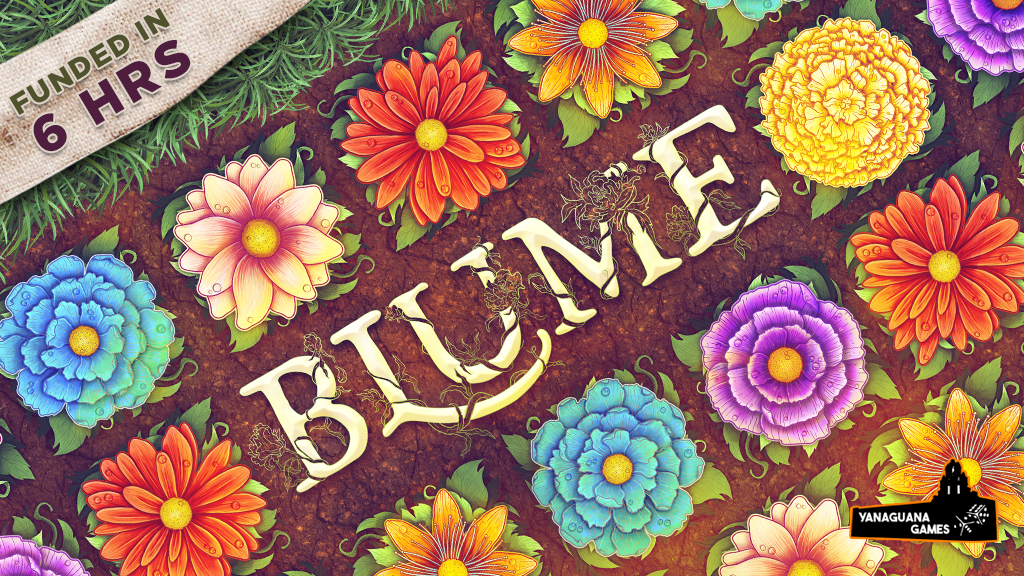Roam (Red Raven Games) – Each player starts the game with three party members. A map is set in the middle of table, made up of six land cards, with each card being divided into six squares. Each of the characters in your party can explore these squares in a different configuration as shown on their card. After exploring the map with a character, you place your exploration cubes on the map in the correct configuration. Once every square on a land card has been filled, the player with the most exploration cubes on it takes the land card, flips it over to the character side, and adds this new character to her team. The game ends once one player has ten characters and the player with the most points wins.
Casual Games on Kickstarter: Fantasy Lands, Fairy Tales, and Flowers in Bloom

This month finds some truly gorgeous artwork on Kickstarter, a game about growing flowers, a solo game that puts you in the role of the French resistance, a social deduction game of villagers and demons, and…high school volleyball?
Paradise Lost (Green Feet Games) – In this fantasy deduction game an evil witch has sent a secret villain, armed with a dangerous weapon, to wreak havoc. At the start of the game, a villain and a weapon card are randomly selected and placed secretly into an envelope. Each player then chooses one of eight heroes to play, each with their own special abilities. Each player is also given two oracle cards which will help them narrow down the possible villain and weapon cards in the envelope. During the game you proceed through a fantasy world that allows you to collect resources such as cubes, gold, and mana. Once all players have reached one of the oracle locations, an oracle card is revealed that further eliminates a possible villain or weapon. If you can pay a fee at the oracle, you can also ask your opponents a question about the oracle cards in their hand. After players have visited the final oracle, they take turns attempting to deduce which monster and weapon is in the envelope. If no player is correct, they all lose.
Blume (Yanaguana Games) – Each player has their own personal garden board, and each round the space in your garden expands. The game takes place over three rounds. On your turn you select a new tile and place it into your garden. Tiles added to your garden must connect to tiles already present in your garden. Tiles have a quarter of a flower in each corner, and you must connect corners to create flowers. Whenever a flower is completed you must take an action. If all four of the flower corners match, you either add one flower to your green house or may increase or decrease a flower’s value in the marketplace. Each round a new hybrid flower is available for you to grow — when you complete one of these, you add both of these flowers to your green house. After your garden is full, you will prune, removing four tiles from your garden, increasing or decreasing this number by one for each hybrid in your garden. The player with the most valuable flowers in their greenhouse at the end of the game wins.
Maquis (Side Room Games) – A solo worker-placement game, Maquis has you fighting the Nazis as French resistance fighters. In order to win the game, you must complete two randomly selected missions in a set amount of time. Each round you assign one of your meeples to a location in the city, and then draw a patrol card which states where the military police will go. You continue placing your pawns and the military police until all pawns are on the board. If the military police share a space with one of your pawns, your pawn is arrested. Different actions are available at the different locations around the city.
Volleyball High (Medieval Lords) – A play mat featuring a volleyball court, with each side having space for six cards, is laid in the center of the table. During set up you select a team, take its three members and its six special move cards. Each member then takes a deck and shuffles their special moves into this deck. You then take three generic players (putting an additional two in reserve) and, together with your other team members, place them on your side of the court, one card in each space. At the start of the game, you draw eight cards from your draw deck and will draw more cards at the end of your turns. Cards are used to serve and hit the ball. Cards have hit and defense values and in order to send the ball back, its defense must equal or exceed the hit value of the card that was used to send it your way. If you can't, you lose a point. If you successfully defend, you can send the ball back with another card. You must choose a member on your team to hit it (discarding cards if the member is not on the space of court where the ball currently is) and then play a card to send it back. The distance number on the card dictates how many spaces the ball moves across the court. Matching cards to certain members of the team can make cards more effective.
Blood on the Clocktower (The Pandemonium Institute) – In this social deduction party game, the village is trying to hunt down a demon. As in games like Werewolf, players discuss during the morning phase their suspicions and information and may choose a player to execute, while during the evening players take actions and learn new information. Each character’s role is unique with its own abilities and information. However, you might not know what you think you know, as players who are poisoned or drunk may be given incorrect information by the moderator. Players who die still remain in the game and you can also join the game already in progress as a traveler with a unique ability and unknown allegiance.
Disclosure: unless otherwise noted, we have not seen or played any of the above games. Our assessment of each is based on the information given on the crowdfunding project page.










